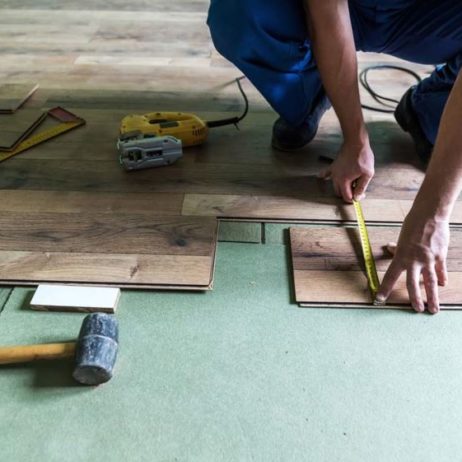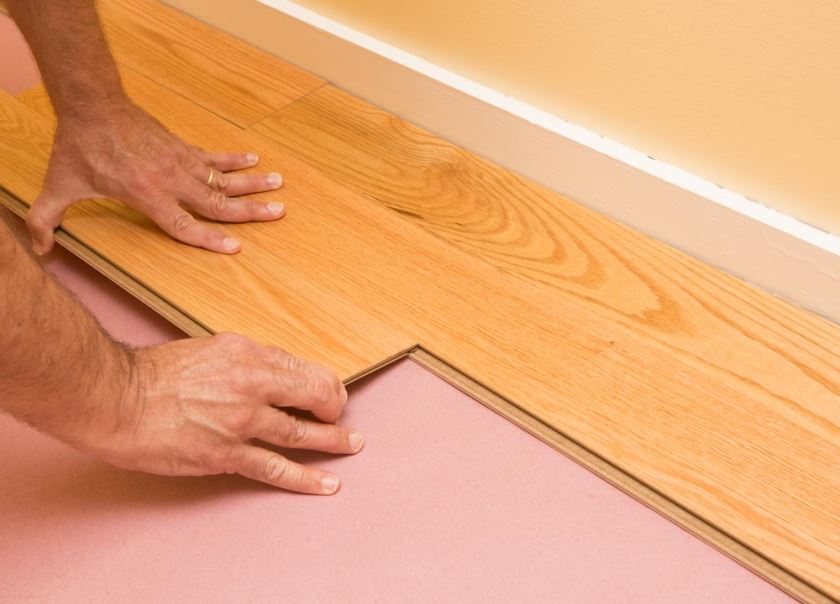
While it’s important to choose the best flooring solution based on your home’s needs – choosing the right installation method is just as important. There are two common installation methods for certain types of flooring: Floating and Glue-down. Here, we look at the pros and cons of a floating floor versus a Glue-down floor and the options you need to consider to make your decision a little less complex.

The first thing you need to know is the layout of each type of flooring. It is important to know exactly what you are getting when you buy glued down or floating flooring. It is important to know how you are going to install the floor and exactly what it contains.
Glued down flooring is considered durable flooring. It can withstand bumps, scratches, and falls. This type is physically connected to the basement below. It can be attached either with glue on the back of the floor or with acrylic tape on both sides.
You can lay the new floor directly on top of this type of floor. If you do not plan on changing floor types in the near future, choosing this floor type makes sense.
The floor of the floating board is simply ‘floating’ on the bottom floor. They have no tape or glue on the back. This makes it very easy to install this type of floor. It can be a project that you do yourself.
So which option is better for you, glue down or floating? You can best answer this question by looking at the situation under your floor.
It is not recommended to install all types of adhesive foam on a floor under high humidity. This includes a low quality concrete pad, such as may be in your basement.
The next point to consider when deciding between glued down floors and floating floors is their durability. It is especially important to consider the room in which your floor will be installed. How will you be using the space?
Since an glue-down floor is physically bonded to the floor, it is firmly in place. If there will be a lot of traffic in the room, this is an ideal option.
It’s also a good choice if the traffic will be facing forward. This includes moving kitchen islands or even wheelchairs. This adhesive keeps the floor in place and does not lift off the floor.
Floating floor installation, on the other hand, is not really connected to the floor. The flooring is still very durable. But in the above scenarios, the version may not be as sticky. This is because it tends to pull away from the floor due to the flowing traffic.
As for cleaning, both types of flooring can be cleaned with a friendly, hard and clean room.
No matter what kind of floor you choose, you should replace it at some point. Hopefully, this will not happen as long as you get years of enjoyment out of your flooring choice. However, when it comes time to replace your floor, which is easier and better, a glue down or floating flooring?
The underside of the glue down flooring allows for a seamless replacement. It is very easy to replace the entire floor by putting a completely new floor on top or replacing the loose boards and tiles one at a time. This is a very simple and painless process.
Floating floors are also easy to replace, although it’s a little more complicated than glued-down floors. That is because each plank is interlocked with the other. So if you need to replace part of the floor, you will need to remove all the floor tiles or planks in the direction of the part you want to replace.
One point you may not consider when choosing flooring is how the flooring affects the acoustics of the room. However, the fact is that your floor will either absorb or radiate sound, creating an echo effect. So which is better for noise, glue down or floating installation?
Both types of flooring can be considered very good for room acoustics. This is especially true when compared to other hard flooring options, as they absorb more sound than other options. Some of these flooring types also have additional sound support to reduce noise even further.
The most important thing to consider when determining the sound impact of your floor is the shape of your floor. If the surface is even and you can glue the floor to it or install the floating evenly. Then your flooring will perform better in reducing noise.
There is another important factor to consider when choosing flooring. This is the way in which you will install it in your home. If you want to save money on the installation of your floor, you need to know the steps involved before you begin the project. So, is choosing a glue down or floating an advantage in this regard?
Floating floors are easy to install. This is almost perfect for someone who enjoys DIY and wants to do it themselves. flooring is very easy to install and clicks together in a simple way.
While you can install flooring yourself, it is not as easy as floating vinyl flooring. The reason for this is that the handling and dealing with the adhesive that is required for this type of flooring is not that easy. So if you do not have experience in this field, you should hire a professional who can install the floor properly.
In short, both Glue down and floating installation are great flooring options for bathrooms, laundry rooms and kitchens where they are needed to protect against overuse and moisture. Choosing which type of flooring to install in your home may depend on whether you plan to install your own flooring or hire a professional. Because glue down flooring requires an adhesive or tape on the floor, it is a little more difficult to install yourself.
if you plan on getting a new flooring, please conctact us, our experts in floorset group can help you choose the right flooring based on your needs.